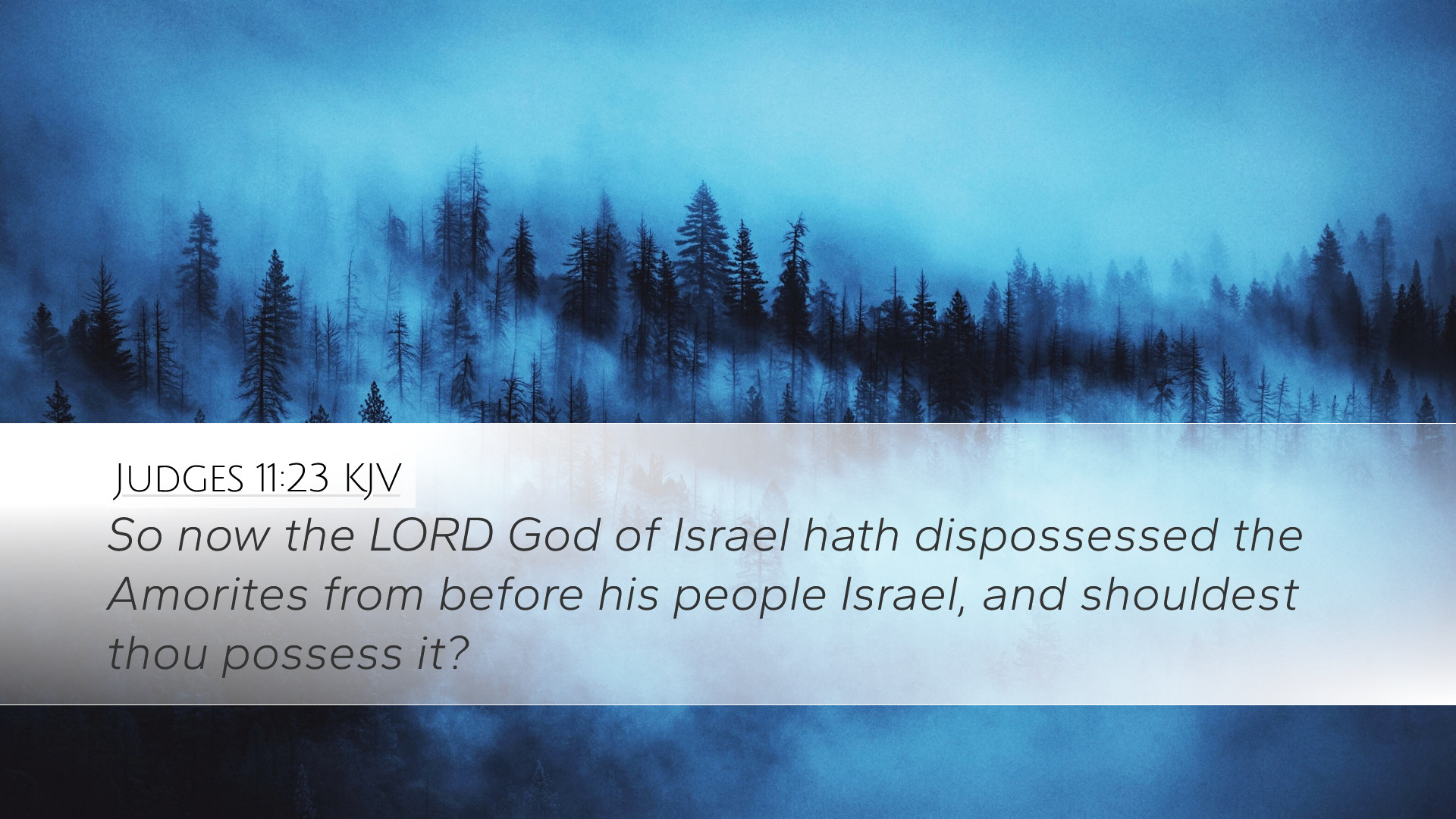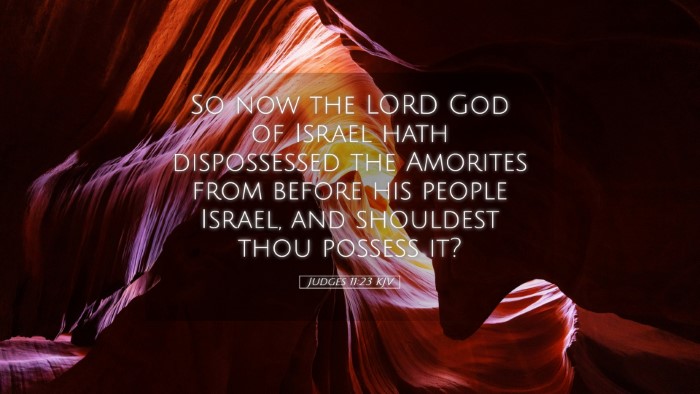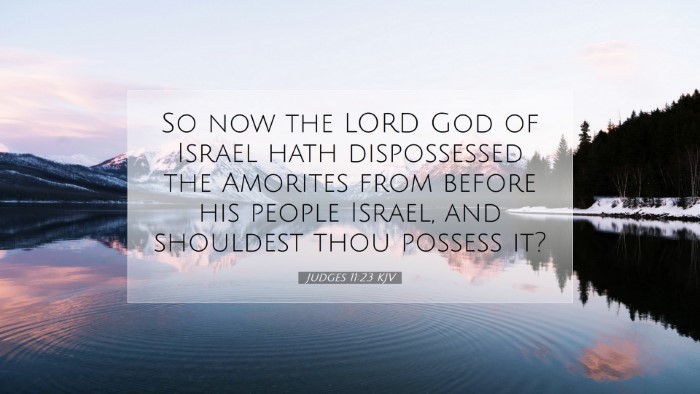Bible Commentary on Judges 11:23
Verse: "So now the LORD God of Israel has dispossessed the Amorites from before His people Israel; should you then possess it?" (Judges 11:23, NKJV)
Introduction
The context of Judges 11:23 involves Jephthah, a judge raised by God to deliver Israel from the oppression of the Ammonites. This verse highlights the sovereignty of God in dispossessing the Amorites from the land intended for His people. Here, we will explore the theological implications and historical context as elucidated by various public domain commentaries.
Historical and Theological Context
Historical Background: The narrative of Judges recounts a period of fragmentation and moral decline in Israel's history, post-Joshua's conquest. The land of Canaan was divinely promised to the Israelites, but it was occupied by various nations, including the Amorites. God’s providence in allowing Israel to reclaim the land is crucial to understanding this verse.
Theological Implications: This verse illustrates God's active role in history. The dispossession of the Amorites is depicted not merely as a military victory but as an act of divine justice and fulfillment of God’s promises to Israel. The sovereignty of God is emphasized, demonstrating His overarching control despite human actions.
Insights from Commentators
Matthew Henry’s Commentary
Matthew Henry emphasizes the action of God in this verse as an expression of His covenant faithfulness. He notes that the Amorites' expulsion was not merely for Israel's benefit but also a part of God's divine plan to execute judgment on nations that had sinned against Him. He points out:
- The Sovereignty of God: Henry illustrates that it is God who dispossesses nations in accordance with His will, and Israel's claim to the land is grounded in God's prior actions.
- Divine Justice: The Amorites are seen as deserving their fate due to their idolatry and immorality, underscoring that God's justice will prevail against ungodliness.
- Israel’s Responsibility: He delicately balances the notion that while God gives victory, Israel must act upon that divine gift in obedience and faith.
Albert Barnes’ Notes on the Bible
Albert Barnes expands upon the geopolitical context of Judges 11:23, providing insight into the relationships between the surrounding nations. He asserts:
- God’s Intervention: Barnes notes that the Lord raised Jephthah during a time of crisis, marking divine intervention in Israel's affairs. His victory over the eastern enemy secured Israel's position in the land.
- Implications for Justice: He discusses the implications of this dispossession within the framework of divine justice and mercy; Israel is positioned as a vehicle for God's will on earth.
- Ethical Considerations: Barnes addresses ethical concerns regarding warfare and dispossession, challenging the readers to reflect on the morality of divine commands in Leadership.
Adam Clarke’s Commentary
Adam Clarke provides a depth of detail regarding the Amorites' history and their interactions with Israel. He highlights the following:
- Covenant Relationship: Clarke indicates that Israel's right to the land stems from their covenant relationship with God, which gives them both a privilege and a responsibility.
- Historical Consequence: He connects the dots between the disobedience of Israel and its consequences, explaining that they had been oppressing their own people before reflecting on God’s mercy in granting deliverance through Jephthah.
- Call to Faithfulness: Clarke encourages believers to recognize God's hand in their circumstances and to remain faithful to His commands as they experience trials.
Exegesis of the Verse
Judges 11:23 serves as a critical pivot in the narrative, drawing attention to several key elements:
- God's Authority: The phrase "the LORD God of Israel has dispossessed" underlines God's authoritative role as the ultimate judge and executor of justice.
- Israel's Inheritance: The reference to "His people Israel" underscores the special relationship between God and Israel as His chosen nation, distinct from others.
- Question of Possession: Jephthah’s rhetorical question invites reflection on rightful ownership and divine promise, prompting a deeper understanding of what it means to occupy land under God's decree.
Applications for Today’s Believers
This verse and the commentary insights provide valuable lessons for modern readers:
- Trust in Divine Sovereignty: Believers are reminded of God's control over history, instilling confidence amidst chaos and uncertainty in contemporary life.
- Understanding Justice: The dispossession of the Amorites serves as a model for understanding God's justice, encouraging believers to seek righteousness in their own lives and societies.
- Call to Obedience: Just as Israel was called to act on God's promises, so are believers urged to embody faith in their actions, living out their calling faithfully.
Conclusion
Judges 11:23 serves as a powerful reminder of God's sovereignty, justice, and the covenant relationship He maintains with His people. Through the commentaries of esteemed authors such as Matthew Henry, Albert Barnes, and Adam Clarke, we gain a richer understanding of the theological depths embedded in this excerpt from Scripture. As pastors, students, and scholars reflect on these insights, may they be inspired to explore the implications of God's word in their ministries and personal lives.


